الأسواق
عند تصميم تدخل إنساني وتحديد ما إذا كان سيتم استخدام المساعدات النقدية والقسائم، يجب أن يكون تحليل السوق جزءًا من تحليل الاستجابة الشامل. وثبت أن دعم الأسواق للعمل بشكل جيد يؤدي إلى تعافي أسرع وزيادة المرونة في المناطق المتضررة من الكوارث.
واستثمرت العديد من المنظمات في تطوير أدوات لدعم تحليل السوق وتفكر في البرمجة القائمة على السوق بشكل أكثر شمولية. يشمل ذلك التدخلات التي تستخدم السوق (مثل التحويلات النقدية إلى السكان المتضررين)، بالإضافة إلى التدخلات التي تدعم الأسواق بشكل مباشر (مثل المنح المشروطة للمتداولين لإعادة تشغيل أسواقهم).
Related initiatives
Featured content

Introduction to Market Analysis
دورة تدريبية
This 30 minute online course provides an introduction to the analysis of markets in emergency contexts, with input from some of the world’s leading thinkers on the topic.

A Practical Guide to Market Analysis in Humanitarian response
دورة تدريبية
A three to four hour online course designed to provide future humanitarian market assessment team members with a solid understanding of theory and steps of market assessments so that they can join assessment teams prepared with a basic understanding of what they will be doing and why.
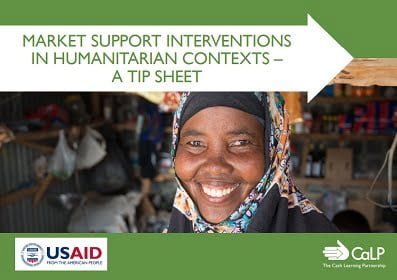
Market Support Interventions in Humanitarian Contexts – a Tip Sheet
Guidelines and Tools
This tip sheet defines what market support programming in humanitarian contexts is, and what it can look like in practice. It enables humanitarian practitioners to systematically consider market support interventions alongside other programme activities. The scope includes support interventions focusing on supply/availability and on demand/access. The tip sheet is based on secondary data...
Latest
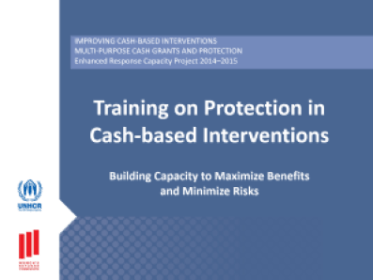
Protection in Cash-based Interventions Training: Building capacity to maximize benefits and minimize risks
Guidelines and Tools
This participatory curriculum is based on the inter-agency Guide for Protection in Cash-based Interventions (CBIs). The one-day training provides practical instruction for analysing and monitoring protection risks and benefits in CBIs. Slides, facilitators’ guide, case studies, and other materials for...

Guidelines on Cash Transfers and Livelihoods – Latin America
Report
This document, like the learning workshop that took place in Guatemala City on 16th and 17th November 2015, focuses primarily on the context in Central America. Due to the profile of the participants and the complex problems of the region (the Dry Corridor, high exposure to hurricanes, high levels of...
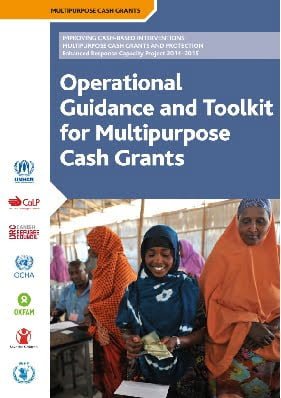
Operational Guidance and Toolkit for Multipurpose Cash Grants
Guidelines and Tools
This operational guidance and toolkit brings together worldwide expertise on cash-based interventions (CBIs). It provides comprehensive and practical guidance for humanitarian actors to assess the feasibility, conceptualise the design and structure the implementation of MPGs. The guidance focuses on...
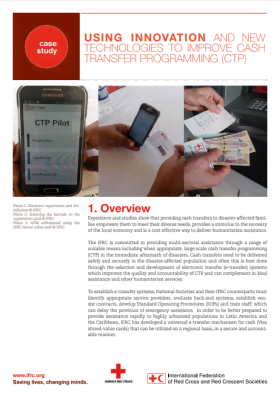
Using Innovation And New Technologies to Improve Cash Transfer Programming (CTP)
Report
Experience and studies show that providing cash transfers to disaster-affected families empowers them to meet their diverse needs, provides a stimulus to the recovery of the local economy and is a cost effective way to deliver humanitarian assistance. The IFRC is committed to providing multi-sectoral...
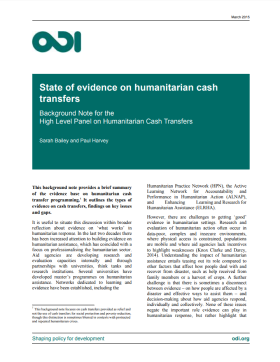
State of Evidence on Humanitarian Cash Transfers
Policy paper
The “State of evidence on humanitarian cash transfers” background note provides a brief summary of the evidence base on humanitarian cash transfer programming. The report also outlines the types of evidence on cash transfers, findings on key issues and gaps. This publication is an output of the...

Markets in Crises: South Sudan case study
Report
Not long after achieving independence, South Sudan descended into conflict, which has fuelled displacement and food insecurity.Although markets continue to function in the country, humanitarians have paid relatively little attention to market-based responses to the crisis. Looking primarily at Juba, this...
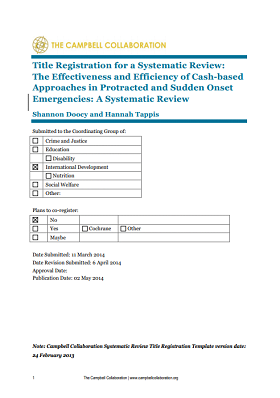
The Effectiveness and Efficiency of Cash-based Approaches in Emergencies: A Systematic Review (Background and Objectives)
Report
This document provides the background, literature review, and objects of the review itself, which is available here. Cash-based approaches have been used for development purposes for a number of decades, particularly within social protection interventions in low- and middle-income countries. Over the...

Part 1.2 The Minimum Expenditure Basket
Report
The Minimum Expenditure Basket (MEB) is defined as what a household requires in order to meet basic needs – on a regular or seasonal basis – and its average cost. Determining the MEB serves three functions: a) it is a holistic reflection of need as perceived by crisis affected populations, including...

AAP Minimum Standards for Complaints & Feedback
Guidelines and Tools
A complaints and feedback mechanism (CFM) is a formal mechanism for receiving and responding to complaints from people in communities where we implement programmes. The main objectives are to increase the influence of affected communities over programmes, ensure that incidences of dissatisfaction with the...
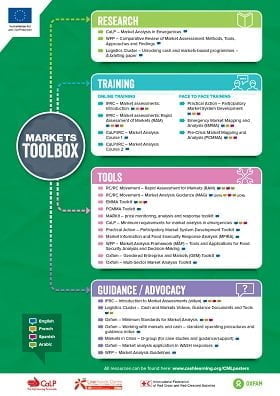
Markets Toolbox
Guidelines and Tools
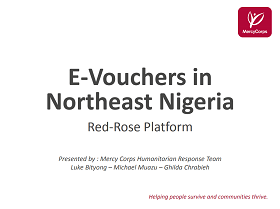
E-Vouchers in Northeast Nigeria
Report
OVERVIEW OF RED ROSE PLATFORM
DECISION TO USE IT. WHY?
The urgency of rapidly responding to the urgent food security needs of
vulnerable households in Northeast Nigeria displaced by conflict while
supporting the rapid recovery of small businesses in the food market
chain.
The importance of fostering...
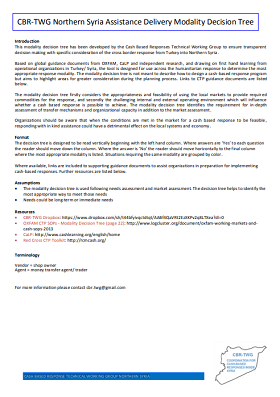
CBR-TWG Northern Syria Assistance Delivery Modality Decision Tree
Report
This modality decision tree has been developed by the Cash Based Responses Technical Working Group to ensure transparent decision making with specific consideration of the cross border response from Turkey into Northern Syria. Based on global guidance documents from OXFAM, the CALP Network and independent...
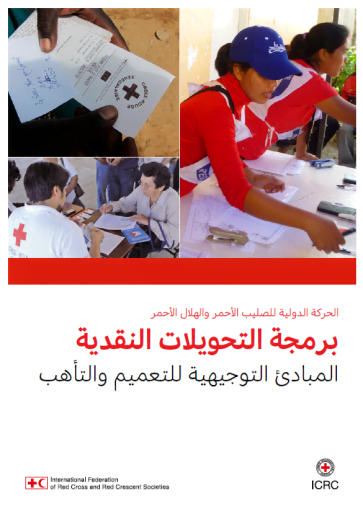
برمجة التحويلات النقدية: المبادئ التوجيهية للتعميم والتأهب
إرشادات وأدوات
مـن المعتـرف بـه علـى نطـاق واسـع أن برامـج التحويـلات النقديـة يمكـن أن تكـون فعاّلـة في دعـم السـكان المتضرريـن مـن الكـوارث أو النزاعـات المسـلحة بطريقة تحافـظ...
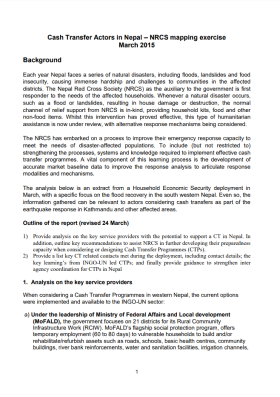
Cash Transfer Actors in Nepal – NRCS Mapping Exercise
Report
Each year Nepal faces a series of natural disasters, including floods, landslides and food insecurity, causing immense hardship and challenges to communities in the affected districts. The Nepal Red Cross Society (NRCS) as the auxiliary to the government is first responder to the needs of the affected...

Evaluation of the OneCard Pilot in Lebanon
Report
The OneCard pilot is part of the WFP-UNHCR Joint Plan of Action for Cash and Vouchers (2014), which aims to implement cash and vouchers using common e-delivery mechanisms. The objectives of the OneCard pilot were: To test the programmatic, technical, and financial efficiency and feasibility of the...
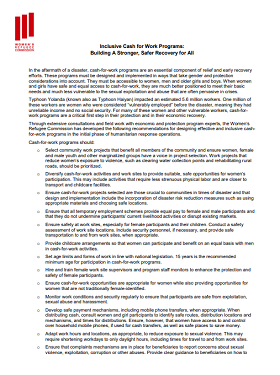
Inclusive Cash for Work Programs: Building A Stronger, Safer Recovery for All
Report
In the aftermath of a disaster, cash-for-work programs are an essential component of relief and early recovery efforts. These programs must be designed and implemented in ways that take gender and protection considerations into account. They must be accessible to women, men and older girls and boys. When...

Workshop Report – Cash Transfer Programming (CTP) in Northern Syria: Where are we now and where do we want to be?
Report
This report summarizes the outcomes of a one day workshop on Cash Transfer Programming (CTP) that was organized by the Cash-Based Responses Technical Working Group (CBR-TWG) for Northern Syria on April 28th 2015 in Gaziantep, Turkey. The workshop was attended by a wide group of stakeholders from the...
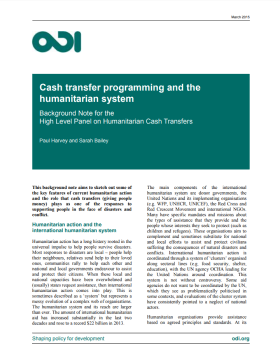
Cash Transfer Programming and the Humanitarian System
Policy paper
Cash transfer programming and the humanitarian system background note aims to sketch out some of the key features of current humanitarian action and the role that cash transfers play as one of the responses to supporting people in the face of disasters and conflict. Additionally, the publication...

Report from the Inaugural Markets and WaSH Learning Event
Report
This report summarizes the presentations and discussions that took place during a learning event on market-based programming targeting key humanitarian stakeholders in the WaSH sector. Held on October 13, 2015 at the IFRC office in Nairobi, the event was organized under the umbrella of the Markets in...
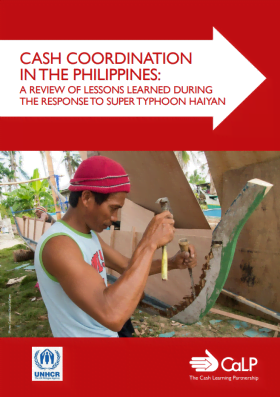
Cash Coordination in the Philippines: A review of lessons learned during the response to Super Typhoon Haiyan
Report
In the last five years there has been a growing trend towards the use of cash transfer programming (CTP) as a response modality in emergencies across the humanitarian sector. The fungibility of cash, when provided without restrictions, offers increased choice for affected populations to...